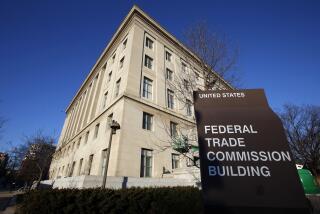Some Tips to Reduce Futures Trading Risk
- Share via
If this week’s indictments of 46 Chicago commodities traders have you scared about futures markets, you’re not alone. Even without the scandal, it is risky territory. At least four of five individual investors who dabble in futures lose money--and that’s assuming their trades are handled properly, as is the case most of the time, since most brokers are honest.
This week’s developments show that even some of the most sophisticated professionals don’t know when they are being cheated by illicit trades. Victims of some of the indicted broker-traders actually thought they were getting good “fills,” or prices at which their trades were executed.
Instead, however, they may have been victims of “front running”--in which a broker-trader illegally trades for his personal account first, profiting from the price movement that will result from the customer order. In other cases, brokers were alleged to have skimmed customer funds, kept more profitable trades for themselves or committed other transgressions.
But if you still want to include futures as part of your investment strategy--knowing that you can earn far more than in stocks, bonds or real estate if you make the right moves--the Chicago probe provides some insights into how to reduce your chances of getting taken:
- Know with whom you are dealing. Although it is no guarantee that you won’t get hurt, deal with reputable firms. Make sure that your broker is registered with the Commodity Futures Trading Commission and is a member of the National Futures Assn., an industry watchdog group. To do that, contact the NFA at (800) 621-3570, or 200 W. Madison St., Suite 1600, Chicago, Ill. 60606. Soon the NFA might also have records on whether your broker has ever been disciplined by any of the exchanges.
- Keep vigilant. Monitor your trades like a hawk. Keep good notes. Review your confirmation statements carefully. “Don’t lose touch with your money,” says Robert K. Wilmouth, president of the NFA.
- Complain vigorously. If you suspect bad trades, call your broker immediately and gripe loudly. Don’t expect anyone else to be vigilant for you. “I wonder how much the big brokerage firms watch every trade,” says Robert N. Gordon, president of Twenty-First Securities, a New York trading house that uses futures.
If your complaint is serious and corrective action hasn’t been taken, consider complaining to the exchanges or to the NFA. They offer arbitration procedures for investors. The Commodity Futures Trading Commission also handles complaints. The NFA acts as a clearing house for information on grievances. To complain or find out more about arbitration, contact the NFA.
- Be wary of “market orders.” Some longtime investors avoid making so-called market orders, the type that require the floor broker to execute at the best possible price at the time the order hits the trading pits. Those orders are most vulnerable to abuse.
To see that your market orders are satisfactorily executed, you must monitor a computer showing the exact price movements at the time of your order, says Almer Orr III, president of A. O. Management Corp., a Pittsburgh firm that manages commodity investments. Otherwise you may never know whether you’ve been shortchanged, he says.
“Once you’re leaving your destiny in someone else’s hand, you’re open for the type of (fraud) that goes on,” Orr says.
Similarly, Orr says, be wary about placing orders to be executed at the open or close of trading. Those also are vulnerable to abuses such as front running or prearranged trading between collaborating brokers.
Accordingly, Orr suggests, stick largely to “limit orders” in which you specify the exact price you want for your trade. There are drawbacks to these orders too, however. If the market moves too fast, and thus away from the price you specified, your order may not be executed unless you specify a new limit order.
- Consider professional management. If you can’t monitor the markets constantly, then you probably have no business trading futures on your own. Instead, consider hiring a professional commodity manager or invest in a private or public commodity pool or fund. They are like mutual funds in that they invest in futures and are professionally managed. Their professional managers are in a better position to make sure you don’t get cheated.
Public commodity funds are run as limited partnerships and require initial investments of as little as $3,000, says Leon Rose, publisher of Managed Account Reports, a Columbia, Md., newsletter that tracks these funds. Privately run commodity pools also qualify as limited partners but require a bit more as an initial investment--say, $5,000 to $10,000, he says. Having your own manager may require at least $50,000.
Some public funds have performed quite well, with some gaining more than 100% annually in recent years. On average they have posted gains in four of the past five years, Rose says. But individual funds can lose big amounts.
They key is finding a fund manager with a good long-term record in both good and bad markets. Several firms monitor commodity pools and funds. One of the best known is Managed Account Reports. Write them at 5513 Twin Knolls Road, Columbia, Md. 21045, for a free sample.
Bill Sing welcomes readers’ comments and suggestions for columns but regrets that he cannot respond individually to letters. Write to Bill Sing, Personal Finance, Los Angeles Times, Times Mirror Square, Los Angeles, Calif. 90053.
More to Read
Inside the business of entertainment
The Wide Shot brings you news, analysis and insights on everything from streaming wars to production — and what it all means for the future.
You may occasionally receive promotional content from the Los Angeles Times.










